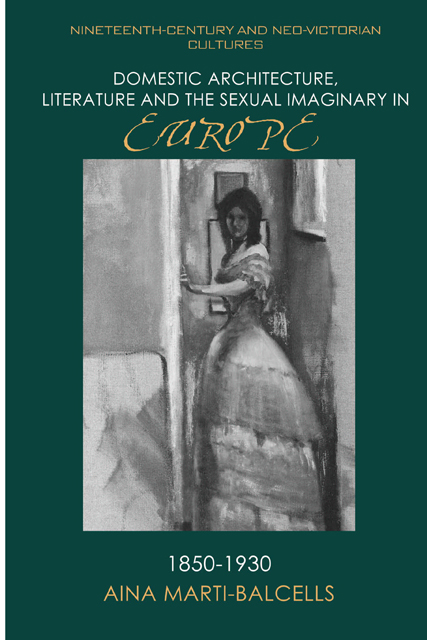Book contents
- Frontmatter
- Contents
- Series Preface
- Dedication
- Introduction
- 1 Adultery and the Subversion of Architectural Prescriptiveness in Madame Bovary and The Return of the Native
- 2 Sexual Accessibility and Exhibitionism: Glass in La Curée
- 3 Glass Dwellings and the Dissolution of Adultery in Fontane’s L’Adultera
- 4 Domestic and Sexual Circulation in Huysmans’ En ménage
- 5 Vienna: Towards a New Domestic Imaginary
- Bibliography
- Index
3 - Glass Dwellings and the Dissolution of Adultery in Fontane’s L’Adultera
Published online by Cambridge University Press: 02 June 2023
- Frontmatter
- Contents
- Series Preface
- Dedication
- Introduction
- 1 Adultery and the Subversion of Architectural Prescriptiveness in Madame Bovary and The Return of the Native
- 2 Sexual Accessibility and Exhibitionism: Glass in La Curée
- 3 Glass Dwellings and the Dissolution of Adultery in Fontane’s L’Adultera
- 4 Domestic and Sexual Circulation in Huysmans’ En ménage
- 5 Vienna: Towards a New Domestic Imaginary
- Bibliography
- Index
Summary
Published in Germany eleven years after La Curée, L’Adultera (1882), mostly located in Berlin, narrates the story of the young Melanie Caparoux, the daughter of a Swiss nobleman, who marries Ezechiel van der Straaten, ‘einer der vollgültigsten Finanziers der Hauptstadt’ (one of the capital’s most important financiers) (Fontane [1882] 1959: 7). Fontane’s narrative opens in the apartment of the van der Straatens located in a new area of Berlin under construction. With two daughters, the van der Straatens live in the fictional Grosse Petristrasse, which is supposed to be near the real Petriplatz (Seiler 2011: 36), itself belonging to the area of Spitalmarkt where new apartment buildings were built in the early 1870s (Deutsche Bauzeitung 1871: 133). Ezequiel invites Ebenezer, ‘ein Volontär, ältester Sohn eines mir befreundeten Frankfurter Hauses’ (a volunteer, the eldest son of a friend of mine in Frankfurt) ([1882] 1959: 17), to spend some time in their summer villa in Tiergarten. Ebenezer starts an affair with Melanie and finally marries her. Ezechiel van der Straaten has his profession in common with Aristide Saccard, as well as his passion for increasing his fortune. Melanie resembles Renée Saccard in the connotations of her origins, which in the text evoke the old domestic tradition and savoir-faire, a marriage of the old to the new money. The Saccards enjoy a glasshouse within their properties, as the van der Straatens did; although Ezechiel sold the glasshouse to the gardener, the family is free to visit and enjoy the glasshouse near their summer residence in the Tiergarten. We will see, however, how Ezechiel’s lack of ownership of the glasshouse relates to his loss of control over Melanie. Paris and Berlin in the novels of Zola and Fontane respectively undergo a process of real estate speculation, which is itself linked to the increasing number of nouveaux riches, and the professions of both Ezechiel and Aristide. Although in Paris this speculative transformation of the city had been taking place since the 1860s, in Berlin, according to Rüdiger Görner it did not occur until the 1880s (2001: 13), the period in which L’Adultera is set. However, mentions of ‘Bauspekulation’ (real estate speculation) (1873: 121) appear in the Deutsche Bauzeitung in 1873 – the first journal dedicated exclusively to architecture and engineering, first published in 1867, and which continues today.
- Type
- Chapter
- Information
- Publisher: Edinburgh University PressPrint publication year: 2022



